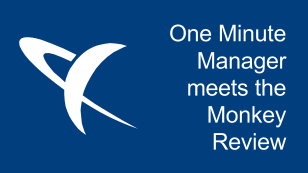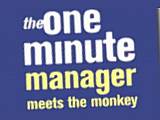Blog
One Minute Manager meets the Monkey Review
 I just finished an excellent book called "The One Minute Manager meets the Monkey" that has shown me how to easily reduce my workload. Read further to learn the secrets ;-)
I just finished an excellent book called "The One Minute Manager meets the Monkey" that has shown me how to easily reduce my workload. Read further to learn the secrets ;-)What is a monkey?
A monkey is simply a task or project but the important factor is that every task requires ownership and supervision. Some monkeys are opportunities but many monkeys can make a manager a bottle-neck and immobilize and reduce opportunities for a company.
The monkey metaphor is a nice way to describe how tasks get pushed toward managers when they really need to be kept away to improve efficiency. For example, if a staff member comes to me and says "I can't find this" or "how should I do that", what do you think is happening? They are passing their Monkey to me:
- They identify a problem and immediately pass it to me
- I take the problem and offer a solution
What monkey management shows us is that it should happen this way:
- Staff member identifies a problem and offers a solution
- I approve solution or recommend alternative
By following some very simple processes I can easily optimize my time and also give staff more responsibility and motivation. Below are the main points I got from the book:

ONKEN'S RULES FOR MONKEY MANAGEMENT
These are the steps you should take when assessing a task with a team member. The dialogue between a boss and their team must not end until all tasks (monkeys) have:
RULE 1. DESCRIPTIONS: The "next moves" are specified
Example from the staff member:
- "I will schedule the project and inform the client when it will be completed and notify you if there are any problems"
- "Prepare a one page brief outlining the problems and possible solutions to this problem"
Benefits:
- Everyone knows that dialogue will not end until "next moves" have been specified
- People get better prepared when they know that their next moves need to be specified
- The rule assumes action by staff
- The more clearly we understand what needs to be done the greater the energy and motivation that exists for doing it.
RULE 2. OWNERS: The monkey is assigned to a person
All monkeys must be handled at the lowest Organizational Level consistent with their welfare
Examples:
- "This website project is now owned by John and Ken is setting up the web hosting"
- "The server will be built by Ken who will also identify and collect all the resources he needs"
- "Mr Avery is now John's client so his satisfaction with our service is John's responsibility"
Reasons:
- Staff have more collective time, energy and in some cases knowledge
- Staff are closer to the work so are better equipment to handle it
- Creates more time for business management
- Management should only handle tasks that only they can do
Benefits: Sometimes when you insist on the very best in your people's work, you may encounter resistance because doing their very best often requires hard work. On the other hand, if you permit your people to be less than their best, they sometimes don't actively resist. So it sometimes seems that they would rather do less than their best. The leaders we remember most in our lives are the ones that push us.
RULE 3. INSURABLE POLICIES: The risk is covered
When people have freedom, they will make mistakes. That's why monkeys need to be insured. At times staff may want to take more risk but the safety and needs of the business need to take precedence.
Monkey insurance policies
- Recommend, and then act. If there is high risk the team member should recommend, get approval from the manager and then act.
- Act, and then advise If there is little risk the team member can act and then advise the manager of the results. As team members get more proficient in their tasks this will happen more but the responsibility has to be delegated from the manager to ensure safety.
RULE 4. MONKEY FEEDING AND CHECKUP APPOINTMENTS: The time and place for follow-up is specified
Monkey health is vital so regular checkups are needed. Our business has a 30 minute meeting in the morning followed by a 15 minute catch-up meeting in the afternoon which really helps identify problems and successes. Monkeys sometimes develop unexpected problems and the process of discovering and correcting problems in meetings tends to:
- Lower the boss's anxieties
- Develop people's competence through coaching - which increases the boss's confidence in their competence and further decreases his or her anxieties
- The coaching increases the odds that the boss will eventually be able to delegate to that person
DELEGATION
Managers should only delegate when they are confident that:
- The project is on the right track and staff know what has to be done
- Their people can successfully handle the project on their own
- That costs, timing, quantity and quality are acceptable
- That there is commitment from staff
THREE TYPES OF ORGANIZATION TIME
It's important that your team understand the three types of organisational time, so they can better manage their time such as:
- Boss-imposed time
"Failing to meet your boss's needs soon results in more boss imposed time."
Examples of boss imposed time include doing chargeable work, preparing a brief report, or planning a job. - System-imposed time Administrative imposed time such as replying to emails, taking calls, meetings, etc. How much of your admin time is actually other people's admin time such as daily planning, client follow-ups or client support? Do your clients also give you their monkeys? Not supplying content on time means that you become their reminder system. Not being organised means that you have to do their organizing for them. It's important that you are clear as to what other people can expect from you and what you expect from them. Why do we always have our documents in order and on time for our Lawyers? Because we value their time.
- Self-imposed time. This is probably the most important because it is the time that you actually choose your own monkeys. I know now that me managing my business such as long-term planning and implementing new software or processes is my most important tasks, but they regularly get interrupted by smaller monkeys trying to jump on my back because I'm good at problem solving. Self-imposed time comes in two forms: discretionary and subordinate imposed. The main idea for me in this book is to reduce subordinate imposed time.
QUOTES FROM THE BOOK
- "It's tough to work for a nervous boss, especially if you're the one making your boss nervous"
- "Why is it that some managers are typically running out of time while their staff are typically running out of work"
- "For every monkey there are two parties involved: one to work it and one to supervise it"
- "Things not worth doing are not worth doing well"
- "Experience is not what happens to you; it's what you do with what happens to you"
- "The more you get rid of your people's monkeys, the more time you have for your people"
- "The best way to develop responsibility in people is give them responsibility"
- "Practice hands-off management as much as possible and hands-on management as much as necessary"
- "Never let the company go down the drain simply for the sake of practicing good management"
- "Assigning involves a simple monkey; delegation involves a family of monkeys"
- "The purpose of coaching is to get into the position to delegate"
- "Swift and obvious penalties pursue those who treat other people's requirements in a lighthearted, cavalier fashion"
Trademe Books
Click here to search for the "One Minute Manager Meets the Monkey" from Kenneth Blanchard.
 About
About
Brynn


